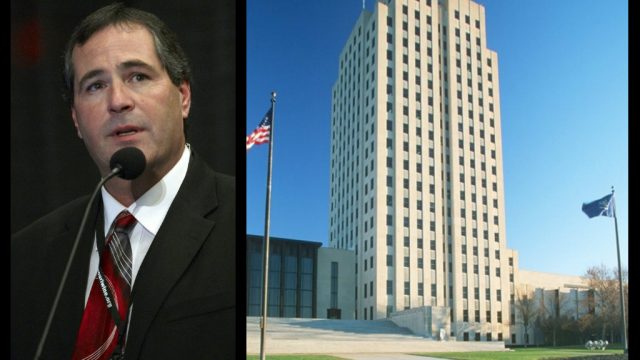Ag Department Changes Exit Interviews Policy After SAB Report

On Thursday I published a story citing exit interviews I obtained through an open records request which illustrated low morale and a high turnover rate at the North Dakota Department of Agriculture. The story was intended to shed light on claims made by former Ag Department employee Katie Pinke who had accused Commissioner Doug Goehring of creating a “hostile work environment.”
The exit interviews gave some level of credence to Pinke’s claims, though Goehring had a much different explanation for the morale issues when I interviewed him, citing intra-office politics.
Today, in catching up on the story, the Fargo Forum reports that Pinke is calling the exit interviews a “sham” because they’re conducted by supervisors, and the Ag Department is changing their policy on the interviews, though which specific changes are being made isn’t included in the article.
Deputy Ag Commissioner Tom Bodine (seen yesterday defending Goehring to Republican party leaders and North Dakota Farm Bureau members) tells the Forum that open records requests for the exit interviews may jeopardize their ability to conduct those interviews in the future:
Bodine said the voluntary exit interviews have been “a hugely valuable tool” for identifying areas of the department in need of improvement, and he fears that publicizing the interviews may discourage employees from participating.
“I don’t know if we’ll get any more in the future just because of this,” he said.
Too bad, I think. The public has a right to know.
What is interesting from this Forum report written by capital reporter Mike Nowatzki is that the female employee who has been in the center of this controversy – the woman Goehring asked to his hotel room to crack his back – is claiming that I was wrong about discrepancies between her report of that incident to Human Resources and her exit interview (though the Forum, in their usual state of pettiness, can’t find the integrity to acknowledge me by name):
In an interview Thursday, Wald said the responses on the questionnaires accurately reflect her answers. She also disagreed with a political blogger’s analysis of her statements as being contradictory, saying the HR report pertained to one isolated incident.
“And so any comments I made were about that specific incident, not about anything that happened or any work office environment after the fact,” she said. “I didn’t and I do not feel uncomfortable around the commissioner.”
Wald said that while the exit interview process didn’t strike her as odd at the time, “In hindsight, I completely understand and I am glad that they are going to be changing it to involve an HR individual who can do it as a non-involved third party.”
Wald, who declined to be interviewed by me when I requested, may say that her words weren’t contradictory (it’s worth nothing that Wald is working under Goehring again, making 35 percent more than before) but a plain reading of her comments to Human Resources and her comments during the exit interview with Deputy Ag Commissioner Tom Bodine paint two very different pictures.
Here’s a screen crab from the HR report dated August 21st, 2012 (read the full report here):
Here’s the pertinent comments on Wald’s exit interview from December of 2012:
Wald can say what she wants now, but she told Human Resources that a) Goehring made her feel awkward during the back cracking incident b) Goehring acts inappropriately around women and c) she wonders if the Commissioner has done or said things that have made other females feel uncomfortable. She also goes on to say in the HR report that if someone talked to Goehring about his behavior “there would be problems.”
That hardly seems in keeping with someone who would later say that it was “a pleasure” working for the commissioner.
Nobody but Wald can speak for why Wald said what she said to HR and in her exit interview, but there’s no question of the contradiction.
Regardless, it’s probably a very good idea that the Ag Department formalize their exit interview process, and hopefully move toward a situation where employees are put in a situation where they can speak more openly about their reasons for leaving.






